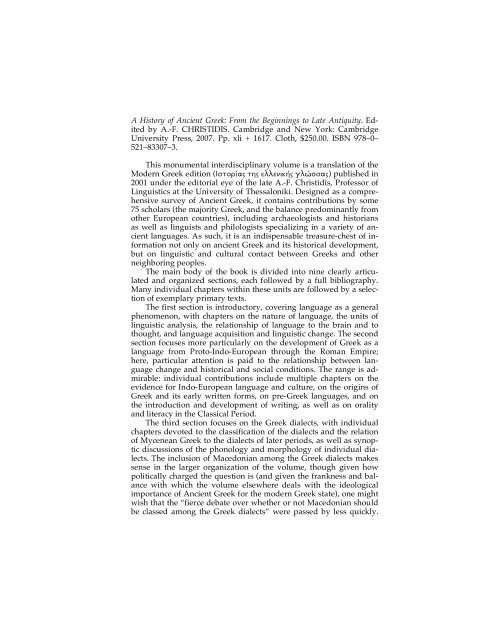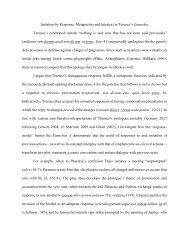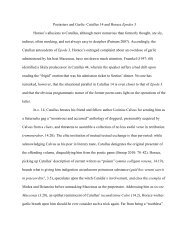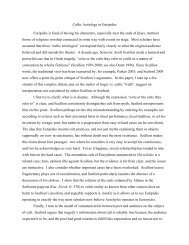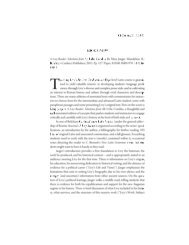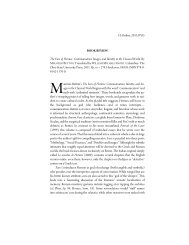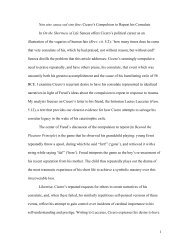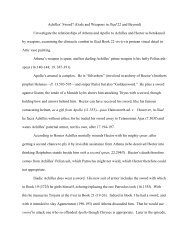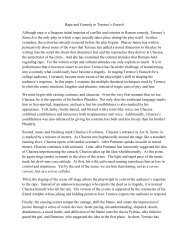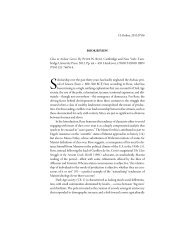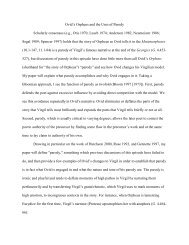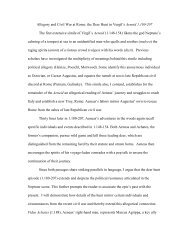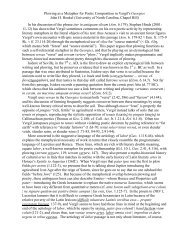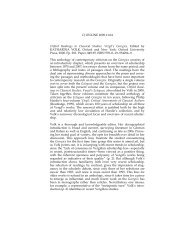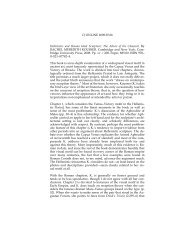A History of Ancient Greek: From the Beginnings to Late Antiquity ...
A History of Ancient Greek: From the Beginnings to Late Antiquity ...
A History of Ancient Greek: From the Beginnings to Late Antiquity ...
Create successful ePaper yourself
Turn your PDF publications into a flip-book with our unique Google optimized e-Paper software.
A <strong>His<strong>to</strong>ry</strong> <strong>of</strong> <strong>Ancient</strong> <strong>Greek</strong>: <strong>From</strong> <strong>the</strong> <strong>Beginnings</strong> <strong>to</strong> <strong>Late</strong> <strong>Antiquity</strong>. Edited<br />
by A.-F. CHRISTIDIS. Cambridge and New York: Cambridge<br />
University Press, 2007. Pp. xli + 1617. Cloth, $250.00. ISBN 978–0–<br />
521–83307–3.<br />
This monumental interdisciplinary volume is a translation <strong>of</strong> <strong>the</strong><br />
Modern <strong>Greek</strong> edition (Ιστορίας της ελλενικής γλώσσας) published in<br />
2001 under <strong>the</strong> edi<strong>to</strong>rial eye <strong>of</strong> <strong>the</strong> late A.-F. Christidis, Pr<strong>of</strong>essor <strong>of</strong><br />
Linguistics at <strong>the</strong> University <strong>of</strong> Thessaloniki. Designed as a comprehensive<br />
survey <strong>of</strong> <strong>Ancient</strong> <strong>Greek</strong>, it contains contributions by some<br />
75 scholars (<strong>the</strong> majority <strong>Greek</strong>, and <strong>the</strong> balance predominantly from<br />
o<strong>the</strong>r European countries), including archaeologists and his<strong>to</strong>rians<br />
as well as linguists and philologists specializing in a variety <strong>of</strong> ancient<br />
languages. As such, it is an indispensable treasure-chest <strong>of</strong> information<br />
not only on ancient <strong>Greek</strong> and its his<strong>to</strong>rical development,<br />
but on linguistic and cultural contact between <strong>Greek</strong>s and o<strong>the</strong>r<br />
neighboring peoples.<br />
The main body <strong>of</strong> <strong>the</strong> book is divided in<strong>to</strong> nine clearly articulated<br />
and organized sections, each followed by a full bibliography.<br />
Many individual chapters within <strong>the</strong>se units are followed by a selection<br />
<strong>of</strong> exemplary primary texts.<br />
The first section is introduc<strong>to</strong>ry, covering language as a general<br />
phenomenon, with chapters on <strong>the</strong> nature <strong>of</strong> language, <strong>the</strong> units <strong>of</strong><br />
linguistic analysis, <strong>the</strong> relationship <strong>of</strong> language <strong>to</strong> <strong>the</strong> brain and <strong>to</strong><br />
thought, and language acquisition and linguistic change. The second<br />
section focuses more particularly on <strong>the</strong> development <strong>of</strong> <strong>Greek</strong> as a<br />
language from Pro<strong>to</strong>-Indo-European through <strong>the</strong> Roman Empire;<br />
here, particular attention is paid <strong>to</strong> <strong>the</strong> relationship between language<br />
change and his<strong>to</strong>rical and social conditions. The range is admirable:<br />
individual contributions include multiple chapters on <strong>the</strong><br />
evidence for Indo-European language and culture, on <strong>the</strong> origins <strong>of</strong><br />
<strong>Greek</strong> and its early written forms, on pre-<strong>Greek</strong> languages, and on<br />
<strong>the</strong> introduction and development <strong>of</strong> writing, as well as on orality<br />
and literacy in <strong>the</strong> Classical Period.<br />
The third section focuses on <strong>the</strong> <strong>Greek</strong> dialects, with individual<br />
chapters devoted <strong>to</strong> <strong>the</strong> classification <strong>of</strong> <strong>the</strong> dialects and <strong>the</strong> relation<br />
<strong>of</strong> Mycenean <strong>Greek</strong> <strong>to</strong> <strong>the</strong> dialects <strong>of</strong> later periods, as well as synoptic<br />
discussions <strong>of</strong> <strong>the</strong> phonology and morphology <strong>of</strong> individual dialects.<br />
The inclusion <strong>of</strong> Macedonian among <strong>the</strong> <strong>Greek</strong> dialects makes<br />
sense in <strong>the</strong> larger organization <strong>of</strong> <strong>the</strong> volume, though given how<br />
politically charged <strong>the</strong> question is (and given <strong>the</strong> frankness and balance<br />
with which <strong>the</strong> volume elsewhere deals with <strong>the</strong> ideological<br />
importance <strong>of</strong> <strong>Ancient</strong> <strong>Greek</strong> for <strong>the</strong> modern <strong>Greek</strong> state), one might<br />
wish that <strong>the</strong> “fierce debate over whe<strong>the</strong>r or not Macedonian should<br />
be classed among <strong>the</strong> <strong>Greek</strong> dialects” were passed by less quickly.
The fourth section deals with <strong>Greek</strong> phonology, morphology, syntax,<br />
pronunciation and vocabulary, and <strong>the</strong>ir development over time.<br />
Individual chapters consider <strong>the</strong> various “Koines” <strong>of</strong> <strong>the</strong> <strong>Greek</strong> East,<br />
Jewish <strong>Greek</strong>, and <strong>the</strong> <strong>Greek</strong> <strong>of</strong> <strong>the</strong> New Testament, as well as personal<br />
names and <strong>the</strong> traces <strong>of</strong> movement <strong>to</strong>ward Modern <strong>Greek</strong>.<br />
The fifth section <strong>of</strong>fers a particularly valuable assembly <strong>of</strong> separate<br />
chapters on <strong>the</strong> points <strong>of</strong> contact between <strong>Greek</strong> and o<strong>the</strong>r ancient<br />
languages, including Thracian, Illyrian, Phrygian, Carian,<br />
Lycian, Lydian, Iranian, Etruscan, Latin, Hebrew, Egyptian and Coptic,<br />
Syriac, Celtic, Indian languages and Arabic. These discussions<br />
lead nicely, in <strong>the</strong> sixth section, <strong>to</strong> a discussion <strong>of</strong> translation and<br />
bilingualism in antiquity, with individual chapters on <strong>the</strong> Septuagint,<br />
<strong>the</strong> <strong>Greek</strong> <strong>of</strong> Roman texts, Phoenician bilingualism and <strong>Greek</strong><br />
translation <strong>of</strong> Lycian and Syriac.<br />
The seventh section, on language and culture, is divided in<strong>to</strong><br />
three subparts. The first treats <strong>the</strong> enormous <strong>to</strong>pic <strong>of</strong> <strong>the</strong> language <strong>of</strong><br />
literary texts, with (unavoidably cursory) discussions <strong>of</strong> a range <strong>of</strong><br />
ancient genres and periods. Included here is a chapter on <strong>the</strong> use <strong>of</strong><br />
dialects in literary texts, unfortunately treating only <strong>the</strong> Archaic and<br />
Classical periods with no mention <strong>of</strong> post-Classical poetry; Hellenistic<br />
literature is consigned <strong>to</strong> a very short chapter <strong>of</strong> its own. The second<br />
subsection surveys specialized and technical languages,<br />
including those <strong>of</strong> law, medicine and philosophy, as well as <strong>the</strong> vocabularies<br />
<strong>of</strong> democracy and early Christianity, and <strong>the</strong> semantic<br />
development <strong>of</strong> select words, including ἑλληνισμός, ἅγιος, ψυχή,<br />
φιλοτιμία, and παράδεισος.<br />
The eighth section, entitled “<strong>Ancient</strong> <strong>Greek</strong>s and Language,” includes<br />
a discussion <strong>of</strong> ancient education, an all-<strong>to</strong>o-brief chapter on<br />
ancient grammarians, and a useful survey <strong>of</strong> Atticism from <strong>the</strong> Hellenistic<br />
period on.<br />
The final section briefly covers <strong>the</strong> fortune <strong>of</strong> <strong>Ancient</strong> <strong>Greek</strong><br />
from <strong>the</strong> medieval period <strong>to</strong> modernity, concluding with a fascinating<br />
treatment <strong>of</strong> <strong>the</strong> ideologically complex place <strong>of</strong> <strong>Ancient</strong> <strong>Greek</strong> in<br />
<strong>the</strong> development <strong>of</strong> Modern <strong>Greek</strong> and <strong>of</strong> <strong>the</strong> <strong>Greek</strong> state.<br />
An extremely useful set <strong>of</strong> appendixes includes discussions <strong>of</strong><br />
diacritics and punctuation as well as a wide range <strong>of</strong> o<strong>the</strong>r important<br />
issues, including proverbs, maxims and riddles, spells, prophetic<br />
discourse, <strong>the</strong> language <strong>of</strong> <strong>the</strong> gods in Homer, obscenity, <strong>the</strong> representation<br />
<strong>of</strong> foreign speech in literature, music, non-verbal communication,<br />
texts preserved on lead tablets, and analogy and sound<br />
change. Although some <strong>of</strong> <strong>the</strong>se make good sense as appendixes,<br />
many would have been better incorporated as chapters in <strong>the</strong> main<br />
body <strong>of</strong> <strong>the</strong> book. The volume concludes with a useful glossary and<br />
comprehensive indexes <strong>of</strong> proper names, words in <strong>Greek</strong> and o<strong>the</strong>r<br />
languages, and terms and subjects.
In sum, this monumental volume will serve as an important resource<br />
for students and scholars in a variety <strong>of</strong> fields. Students looking<br />
for an easily manageable overview <strong>of</strong> <strong>Ancient</strong> <strong>Greek</strong> and its<br />
development may find it easier <strong>to</strong> start with a handbook like L.R.<br />
Palmer’s classic The <strong>Greek</strong> Language or G. Horrock’s <strong>Greek</strong>: A <strong>His<strong>to</strong>ry</strong><br />
<strong>of</strong> Its Language and its Speakers. But no o<strong>the</strong>r volume <strong>of</strong> a comparable<br />
range or scope exists, and this book should and will be widely consulted<br />
by anyone interested in <strong>the</strong> his<strong>to</strong>ry <strong>of</strong> <strong>Ancient</strong> <strong>Greek</strong> and its<br />
afterlife in <strong>the</strong> Byzantine, Renaissance and Modern periods.<br />
George<strong>to</strong>wn University<br />
ALEXANDER SENS


